June 21, 2025 | 01:05 GMT +7
June 21, 2025 | 01:05 GMT +7
Hotline: 0913.378.918
June 21, 2025 | 01:05 GMT +7
Hotline: 0913.378.918
In Nha Trang city, Khanh Hoa province, the National Agricultural Extension Center (NAEC) has just held a forum on Agricultural Extension (AE) with the theme "Development of sustainable marine cage farming, adaptation to climate change".
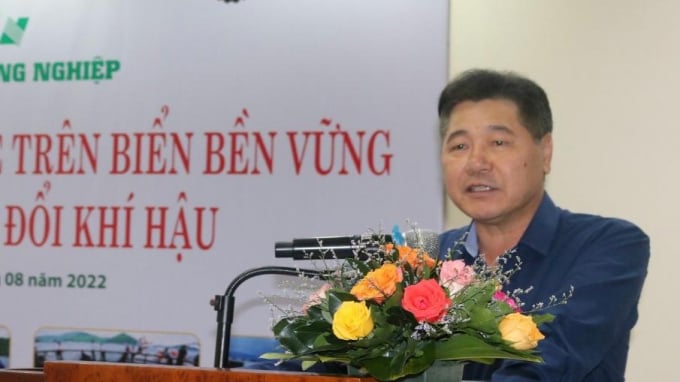
Mr. Le Quoc Thanh, Director of the National Agricultural Extension Center said that it is necessary to reorganize marine aquaculture production. Photo: KS.
Mr. Le Quoc Thanh, Director of the NAEC, said that Vietnam has many potentials and advantages for marine aquaculture development including a coastline of over 3,260km, 1 million sq.km of exclusive marine economic zones, over 4,000 large and small islands, and many straits and bays.
With the attention of the Government and the Ministry of Agriculture and Rural Development (MARD). a project on marine aquaculture development to 2030, with a vision by 2045 was approved by the Prime Minister in 2021.
The Government has directed the MARD to study how to approach fishermen, fishery and fishing grounds in the most harmonious way to reduce fishing but increase farming. This is a very important point of view.
The MARD has also instructed its units to develop new economic thinking in agricultural production replacing the old one that only focussed on output as before.
According to Mr. Thanh, there should be a strategy for marine aquaculture in the application of new technologies, new solutions, and new perspectives because it is not only for fishermen but also for integrated socio-economic development, especially in solving marine environmental problems. Moreover, marine aquaculture development is not only the task of the fisheries sector and the AE system alone but also involves all MARD agencies and localities.
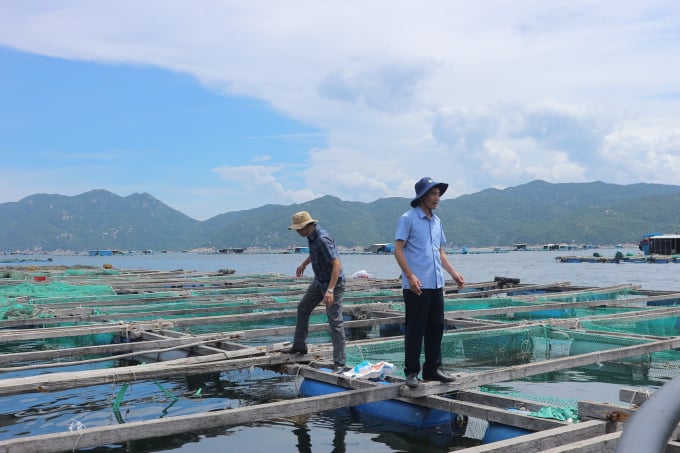
Marine farming today is mainly conducted in wooden cages facing many risks of natural disasters. Photo: KN.
According to the Directorate of Fisheries (DoF), in 2021, the whole country raised different marine fish species on about 9,000ha of water and 4 million cu.m of cages with a total output of 57,837 tons.
Over the past time, marine aquaculture has made strong changes, contributing to creating jobs, improving people's living standards and promoting socio-economic development in seas and islands. However, marine farming in general and marine fish farming in particular is still spontaneous, lacks detailed planning while infrastructure conditions are still limited with farmers' production skills having not met the requirements...
Change quickly to HDPE cages
Mr. Nguyen Huu Dung, Chairman of the Vietnam SeaCulture Association, marine aquaculture in the central provinces faced challenges mostly in solving issues of small-scale households with outdated technology, raising near coastal areas, and too few business investments in marine farming.
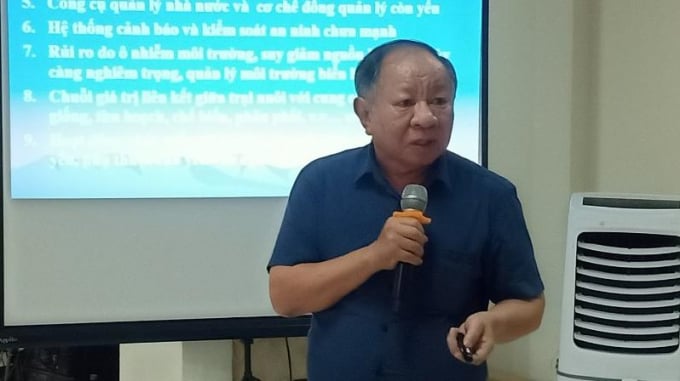
Mr. Nguyen Huu Dung, Chairman of Vietnam Seaculture Association. Photo: KS.
He said that moving from inshore to far offshore aquaculture is the right direction, but very difficult in reality. The current situation of farming cages is about the wood and bamboo cages themselves, so they are very easily damaged if they face the wind at level 7. The future of marine aquaculture should be switched to industrial farming. Another challenge in marine aquaculture is that the old planning has expired, but the new one has not been completed.
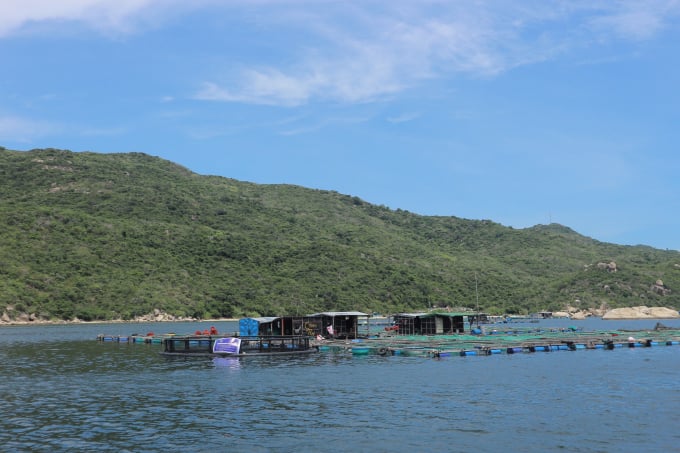
Marine farming in Van Phong bay, Van Ninh district (Khanh Hoa province). Photo: KS.
Many fishermen wonder about the efficiency of aquaculture with HDPE cages and the investment costs of this cage. Explaining this issue, Mr. Huynh Kim Khanh, Director of Khanh Hoa Agricultural Extension Center, said that compared to traditional wooden cages, HDPE cages have more advantages in withstanding waves and have fewer risks of damage. Farming in HDPE cages, the yield can reach 15-20kg/m3, while it is only 7-10kg/m3 in wooden ones.
Currently, HDPE cages with a diameter of 10m, equivalent to a volume of 500m3, cost about VND180 million. Its durability is over 20 years, while the wooden cage is only 5 years. Therefore, the investment cost of HDPE cages after 20 years is cheaper than wooden cages.
Regarding the practice of raising cobia with 500m3 HDPE cages in Van Phong Bay (Van Ninh) deployed by the Center, Mr. Khanh said that fishermen can raise and get an output of 10 tons/cage. After deducting costs, farmers can earn more than VND100 million/cage with a profit margin increased by 15-20% compared to traditional cages with the same volume.
Explaining fishermen's concern about the policy of supporting fishermen to convert into HDPE cages, the leader of the Center said that the Khanh Hoa provincial People's Committee has assigned the Department of Agriculture and Rural Development (DARD) to develop mechanisms and policies to help fishermen who have changed to use the HDPE cages. In the immediate future, for businesses, Super Truong Phat Plastic Company has also issued a policy of supporting 30% for farmers installing HDPE cages.
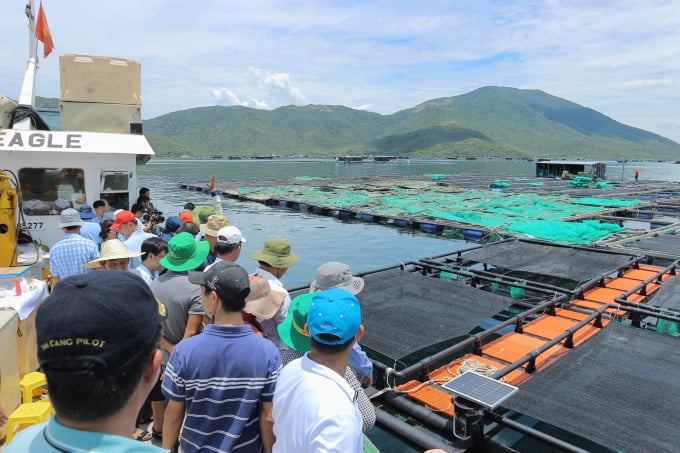
Fishermen visit the HDPE cage farming model in Van Phong Bay, Khanh Hoa province. Photo: KN.Ảnh: KN.
Mr. Hoang Van Hong, Deputy Director of the NAEC said that he would collect comments and report to the MARD on problems as well as update information about the development of sea aquaculture.
For research institutes, he recommended research on varieties, production technologies, markets, especially international markets, and products that are needed to develop products for export.
Mr. Tran Cong Khoi, Deputy Director of the Aquaculture Department (Directorate of Fisheries), said that the DoF is currently directing the revision of Decree 67/2014/ND-CP and many policies such as one-time post-investment support worth VND400,000/m3 of cages for raising in 3-6 nautical miles, VND1 million/m3 for cages in 6 nautical miles; insurance policy, policy on training human resources for marine aquaculture. From now until the end of the year, the DoF will submit to the Government for promulgation of such policies. For marine aquaculture licensing, Khoi suggested that fishermen contact the DARD to get guidance while for the allocation of sea areas for marine farming, they can contact the Department of Natural Resources and Environment for guidance.
Translated by Linh Nguyen
![Turning wind and rain into action: [9] Digitizing hydrometeorological data in response to climate change](https://t.ex-cdn.com/nongnghiepmoitruong.vn/608w/files/news/2025/06/17/z6704423696987_15fd32ffc26d590d204d520c9dac6786-nongnghiep-165943.jpg)
(VAN) Farmers have begun accessing hydrometeorological applications to adjust their cropping schedules, aiming to ensure productivity and adapt to climate change.
![Turning wind and rain into action: [8] Real-time salinity detection and early warning technology](https://t.ex-cdn.com/nongnghiepmoitruong.vn/608w/files/news/2025/06/17/z6704423696987_15fd32ffc26d590d204d520c9dac6786-nongnghiep-151127.jpg)
(VAN) Thanks to the integration of modern hydrological-hydraulic models, remote sensing technologies, and artificial intelligence, the accuracy of hydrological forecasting has significantly improved.
![Turning wind and rain into action: [7] Early disaster warnings help marine farmers minimize losses](https://t.ex-cdn.com/nongnghiepmoitruong.vn/608w/files/news/2025/06/17/z6704423696987_15fd32ffc26d590d204d520c9dac6786-nongnghiep-142942.jpg)
(VAN) In recent years, thanks to early disaster warnings and forecasting, marine farmers in Khanh Hoa province have been able to reduce risks and losses, thereby improving production efficiency.
![Turning wind and rain into action: [6] ‘Four on-the-spot’ disaster management software](https://t.ex-cdn.com/nongnghiepmoitruong.vn/608w/files/news/2025/06/17/e5a48259d6a262fc3bb3-nongnghiep-183800.jpg)
(VAN) By simply activating the scenario on the disaster management software, the relevant authorities immediately know how many households need to be evacuated, where to evacuate them to, and by what means of transportation…
![Turning wind and rain into action: [5] Hue applies modern technology in disaster forecasting](https://t.ex-cdn.com/nongnghiepmoitruong.vn/608w/files/news/2025/06/17/z6704423696987_15fd32ffc26d590d204d520c9dac6786-nongnghiep-093938.jpg)
(VAN) In Hue city, modern technology has recently been applied in meteorological and hydrological forecasting and warning, helping to reduce the damage caused by natural disasters.

(VAN) A cutting-edge farming technique being implemented on an experimental ranch in Arizona's Sonoran Desert has already saved a billion gallons of water over five years, according to Civil Eats.

(VAN) Poultry and pig production and the environment can be boosted through enhanced water technology, according to new research.